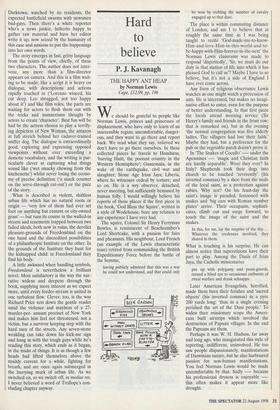Hard to believe
P. J. Kavanagh
THE HAPPY ANT HEAP by Norman Lewis Cape, £12.99, pp. 196 We should be grateful to people like Norman Lewis, princes and princesses of displacement, who have only to learn of an inaccessible region, uncomfortable, danger- ous, and they want to go there and report back. We read what they say, relieved we don't have to go there ourselves. In these collected pieces he travels to Honduras, `barring Haiti, the poorest country in the Western Hemisphere'; Guatemala, in the wake of the earthquake, civil war and slaughter; Stone Age Irian Jaya; Liberia, where he witnesses ordeal by torture; and so on. He is a wry observer, detached, never sneering, but sufficiently bemused by human folly. I would willingly believe his reports of these places if the first piece in the book, 'God Bless the Squire', written in a style of Wodehouse, bore any relation to any experience I have ever had.
The squire, Colonel Sir Henry Ferryman Bowles, is reminiscent of Beachcomber's Lord Shortcake, with a passion for fairs and pheasants. His neighbour, Lord French (an example of the Lewis characteristic tone) retired from commanding the British Expeditionary Force before the battle of the Somme,
having publicly admitted that this was a war he could not understand, and that could only be won by trebling the number of cavalry engaged up to that date.
The place is within commuting distance of London, and am I to believe that at roughly the same time as I was being taught to recite 'God-made-me-to-know- Him-and-love-Him-in-this-world-and-to- be-happy-with-Him-forever-in-the-next' the Norman Lewis classroom was made to respond 'dispiritedly', 'Sir, we must do our duty in that station of life into which it has pleased God to call us'? Maybe I have to so believe, but it's not a side of England I have ever come across.
Any form of religious observance Lewis watches as one might watch a procession of ants. He is interested, but makes no imagi- native effort to enter, even for the purpose of better understanding. In that first piece the locals attend morning service (Sir Henry's family and friends in the front row; that is remarked on), but in the evening `the normal congregation was five elderly ladies. The villagers had lost their faith.' Maybe they had, but a preference for the pub or the vegetable-patch doesn't prove it.
In 'The Snakes of Cocullo' — under the Apennines — 'magic and Christian faith are hardly separable'. Were they ever? In Italy? Shepherds took their dogs into church to be touched 'reverently' (his inverted commas) by a shoe from the mule of the local saint, as a protection against rabies. Why not? On his feast-day the saint's image is paraded, festooned with snakes and 'big cars with Roman number plates' arrive. Their occupants, sophisti- cates, climb out and surge forward, to touch the image of the saint and the snakes.
In this, for me, lay the surprise of the day... Whatever the credences involved, they shared in them.
What is touching is his surprise. He can almost notice that superstitions have their part to play. Among the Danis of Irian Jaya, the Catholic missionaries
put up with polygamy and penis-gourds, turned a blind eye to occasional outbursts of ritual warfare and drank schnapps.
Later American Evangelists, horrified, made them burn their fetishes and 'sacred objects' (his inverted commas) in a pyre 200 yards long: 'thus in a single evening perished the art of the Dani people.' To widen their missionary scope the Ameri- cans built airstrips which involved the destruction of Papuan villages. In the end the Papuans ate them.
Perhaps it was W. H. Hudson, far away and long ago, who inaugurated this style of reporting, indifferent, uninvolved. He too saw people dispassionately, manifestations of Darwinian nature, but he also harboured passion for non-human manifestations. You feel Norman Lewis would be made uncomfortable by that. Sadly — because his professional dryness is enjoyable this often makes it appear more like drought.
























































 Previous page
Previous page